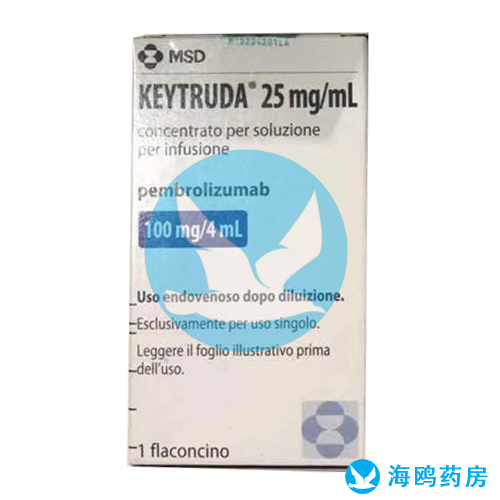Pembrolizumab Prolongs Survival Over Placebo for Persistent, Recurrent, or Metastatic Cervical Cancer
Survival among patients with persistent, recurrent, or metastatic cervical cancer who were receiving chemotherapy with or without bevacizumab (Avastin) was significantly prolonged when treated with pembrolizumab (Keytruda) compared with placebo, according to the double-blind phase 3 KEYNOTE-826 trial (NCT03635567) published in The New England Journal of Medicine.

Specifically, median progression-free survival (PFS) for patients with a PD-L1 combined positive score of 1 or more (n = 548) was 10.4 months in the pembrolizumab group compared with 8.2 months in the placebo group (HR, 0.62; 95% CI, 0.50-0.77; P <.001). For the same cohort of patients with a PD-L1 combined positive score of 1 or more, overall survival (OS) was also longer, with a 24-month estimated rate of 53.0% (95% CI, 46.0%-59.4%) in the pembrolizumab group compared with 41.7% (95% CI, 34.9%-48.2%) in the placebo group (HR, 0.64; 95% CI, 0.50-0.81; P <.001).
“In this phase 3 trial of pembrolizumab plus chemotherapy with or without bevacizumab as compared with placebo plus chemotherapy with or without bevacizumab for persistent, recurrent, or metastatic cervical cancer, the success criteria for all 6 primary hypotheses were met at the protocol-specified first interim analysis,” the investigators wrote.
Eligibility criteria for the study required patients to be age 18 years or older with confirmed diagnosis of persistent, recurrent, or metastatic adenocarcinoma, adenosquamous carcinoma, or squamous-cell carcinoma of the cervix. Patients could not have been previously treated with systemic chemotherapy, although previous radiotherapy was permitted if completed at least 2 weeks before randomization. An ECOG performance staus of 0 or 1 and measurable disease according to RECIST 1.1 criteria were also required.
Patient randomization was done in a 1:1 fashion, with 308 patients being assigned to the pembrolizumab group and 309 to the placebo. Patients received either pembrolizumab at 200 mg or placebo every 3 weeks for 35 cycles. Treatment continued until radiographic progression, unacceptable toxicities, use of prohibited therapy, investigator decision, or withdrawal of consent.
The co-primary end points of the research were PFS and OS assessed via RECIST 1.1 criteria. Secondary end points included the percentage of confirmed complete or partial responses, duration of response, and the percentage of patients alive without disease progression at 12 months, which were all also assessed according to RECIST 1.1 criteria.
A total of 617 patients were included in the intent-to-treat population and were randomly assigned to the pembrolizumab and placebo groups between November 20, 2018, and January 31, 2020. Bevacizumab was incorporated into treatment for 63.6% of patients in the pembrolizumab group and 62.5% of patients in the placebo group. The median patient age was 51 years and 50 years in the pembrolizumab and placebo groups, respectively. In both groups, most patients were White (55.2% and 61.5%), had an ECOG performance score of 0 (57.8% and 55.0%), and had squamous cell carcinoma (76.3% and 68.3%), respectively.
For patients with a PD-L1 combined positive score of 10 or more (n = 317), median PFS was 10.4 months (95% CI, 8.9-15.1) in the pembrolizumab group compared with 8.1 months (95% CI, 6.2-8.8) in the placebo group (HR, 0.58; 95% CI, 0.44-0.77; P < .001). OS also favored the pembrolizumab group, with a 24-month estimate of 54.4% (95% CI, 45.5%-62.4% compared with 44.6% (95% CI, 36.3%-52.5%) in the placebo group (HR, 0.61; 95% CI, 0.44-0.84; P = .001).
Patients with a PD-L1 combined positive score of 1 or more had a confirmed response rate of 68.1% in the pembrolizumab group vs 50.2% in the placebo group. In the intent-to-treat group, the response rates were 65.9% and 50.8%, respectively. For patients with a combined score of 10 or more, response rates were 69.6% and 49.1% in the pembrolizumab and placebo groups, respectively. Rate of complete responses and duration of responses were both significantly longer in the pembrolizumab group than the placebo group, as well.
The median treatment duration was 10.0 months and 7.7 months in the pembrolizumab and placebo groups, respectively. Grade 3/5 adverse effects (AEs) were common in both groups, and were seen in 81.8% of patients treated with pembrolizumab and 75.1% of patients treated with placebo. Serious AEs were observed in 49.8% and 42.4% of patients in those groups, respectively.
Common any grade AEs in both groups were anemia, alopecia, and nausea, with frequent grade 3/5 AEs in both groups including anemia, neutropenia, decreased neutrophil count, and hypertension.
“In general, pembrolizumab did not exacerbate known toxic effects of chemotherapy and bevacizumab, and chemotherapy and bevacizumab did not exacerbate immune-mediated [AEs] associated with pembrolizumab,” the investigators wrote.
https://www.cancernetwork.com/view/pembrolizumab-prolongs-survival-over-placebo-for-persistent-recurrent-or-metastatic-cervical-cancer
Disclaimer:《Pembrolizumab Prolongs Survival Over Placebo for Persistent, Recurrent, or Metastatic Cervical Cancer》Edited and sorted by Seagull Pharmacy's editors. Please contact us in time if there is any infringement. In addition, the suggestions for drug usage, dosage and disease mentioned in the article are only for medical staff's reference, and can not be used as any basis for medication!